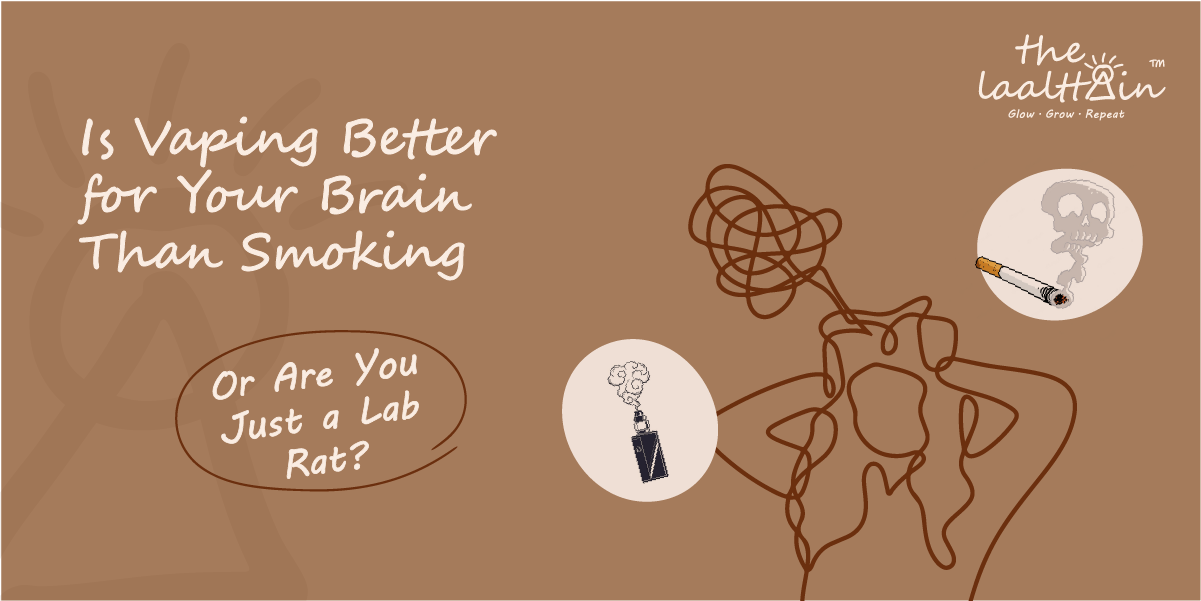
Hello my Lovely Luminer! Let’s talk about something we don’t think about enough—vaping and how it messes with (or helps?) our minds. Sure, vaping feels like a modern, sleek alternative to smoking, but is it really better? And more importantly, what’s going on in our brains when we inhale that fancy mango-flavored mist?
Let’s break it down in a way that makes sense, using science, a little psychology, and some real talk.
Why Vaping Feels Like a Genius Idea (But Isn’t Always)
Okay, here’s the deal: vaping feels like it’s giving you the best of both worlds. You get that nicotine buzz without the tar and toxic smoke. And let’s not lie, it’s super convenient—you can vape indoors, no one gives you the stink eye, and it doesn’t leave your fingers smelling like an ashtray.
Nicotine does a lot for your brain. It’s why you feel that rush of focus, calmness, or even confidence. Research shows that nicotine can improve attention and memory for a bit. But here’s the kicker—it’s ridiculously addictive. It’s like making friends with someone who’s fun at first but slowly takes over your life.
So, is vaping better than smoking? Physically, yes. If you’re a smoker, switching to vaping will reduce the damage to your body. However, vaping isn’t risk-free—it’s only safer in comparison to smoking, and its long-term effects are still uncertain.
The Mind Game: Why Vaping Hooks You So Fast
Vaping isn’t just about nicotine; it’s about what your brain thinks when you vape. Here’s a simple psychological breakdown:
- The Dopamine Hit: When you vape, nicotine gets to your brain in seconds. It triggers dopamine, which makes you feel good. But over time, your brain gets used to it and craves more. Without it, you feel restless, irritable, and maybe even anxious.
- Flavors Are a Trap: Bubblegum, mint, or mango—these flavors make vaping feel playful, even harmless. But it’s clever marketing. Your brain associates the pleasant taste with a good experience, and boom—you’re hooked.
- The Social Vibe: Vaping culture is a thing now. Everyone’s doing it, especially on social media, where vape tricks look cool. The Fear of Missing Out (FOMO) is real, and it pushes people—especially teens—to give it a try.
How Vaping Affects Your Mental Health
Let’s get real here. Vaping isn’t as harmless as it looks.
- Anxiety and Stress: Many people vape to chill out. But here’s the twist—nicotine may make you feel calm for a while, but it also messes with your natural ability to manage stress. So, when you’re not vaping, you might feel more anxious.
- Messing with Your Brain’s Wiring: If you’re young (say under 25), your brain is still developing. Studies show that nicotine can mess with your ability to focus, control impulses, and even regulate emotions. Think of it like teaching your brain bad habits while it’s still learning.
- Dependency Feels Like a Trap: Ever noticed how vaping becomes part of your routine—like with your morning coffee or during a study break? That’s not just habit; it’s a psychological dependency. Your brain starts to associate vaping with relaxation or productivity, making it harder to quit.
The Big Unknown: What Science Still Doesn’t Know About Vaping
Now, here’s where things get a little scary. Vaping is still new—about a decade old. Scientists are still figuring out its long-term effects, especially for non-smokers who vape regularly.
What we do know is that inhaling aerosol (which isn’t vapor but tiny sticky particles) can irritate your lungs and immune system. Research also suggests that heavy vaping might increase your heart rate and blood pressure. But the real kicker? Most vape liquids contain chemicals we haven’t studied thoroughly yet.
So, we’re kind of running a live experiment on ourselves.
How Your Mind Shapes the Vaping Trend
Let’s flip the script for a moment. Vaping doesn’t just affect how your brain and mind function—it’s also shaped by the way our minds are wired. Our habits, coping mechanisms, and even how we respond to peer pressure or marketing influence whether we pick up vaping in the first place. It’s a two-way street: the mind drives the trend as much as it’s shaped by it.
It’s also shaped by how we think and behave as a society.
- Instant Gratification: We live in a world of quick fixes, and vaping fits right in. Feeling stressed? Take a hit. Need a break? Vape. It’s an easy, fast solution, but it keeps you from learning better ways to handle life’s ups and downs.
- Marketing Psychology: Vape brands know how to play you. They use sleek designs, vibrant colors, and influencer endorsements to make vaping look fun and harmless. It’s not a coincidence—it’s psychology in action.
Breaking the Habit: Why Quitting Is Tough but Possible
If you’re thinking about quitting vaping, here’s what you’re up against:
- Nicotine Withdrawal: The first 72 hours are rough. You might feel cranky, restless, or just blah. But hang in there—it gets better.
- Psychological Cravings: Breaking the routine is harder than it seems. You’ll need to replace those “vape moments” with healthier habits, like deep breathing, taking a walk, or even chewing gum.
Here’s a pro tip: Don’t do it alone. Whether it’s therapy, a support group, or just a friend who’s got your back, quitting is easier with someone cheering you on.
Prriyanka’s Bonus Insights
So, back to the big question: Is vaping better than smoking? If you’re a smoker, switching to vaping is definitely a step up for your physical health. However, vaping isn’t risk-free—it’s only safer in comparison to smoking, and its long-term effects are still uncertain.
Here’s the truth: Vaping feels good in the moment, but it’s a short-term win with long-term costs. Your brain deserves better than being stuck in a cycle of dependency.
At The Laalttain, we believe that understanding what’s really going on in your mind is the first step toward taking control. Whether you’re vaping, quitting, or just curious, the more you know, the better choices you can make.
Got questions? Drop them below—let’s keep the conversation going. Your mind is worth it!
References
- Public Health England (2015): “E-cigarettes: an evidence update” – Highlighting that vaping is 95% less harmful than smoking.
- National Institute on Drug Abuse (NIDA): Information on how nicotine affects the brain and its addictive properties.
- The Lancet Respiratory Medicine (2019): Research on the unknown long-term effects of vaping and aerosol inhalation.
- Centers for Disease Control and Prevention (CDC): Data on teen vaping trends and the impact on youth mental health.
- Royal College of Physicians (2016): Report emphasizing harm reduction in smoking cessation through vaping.

